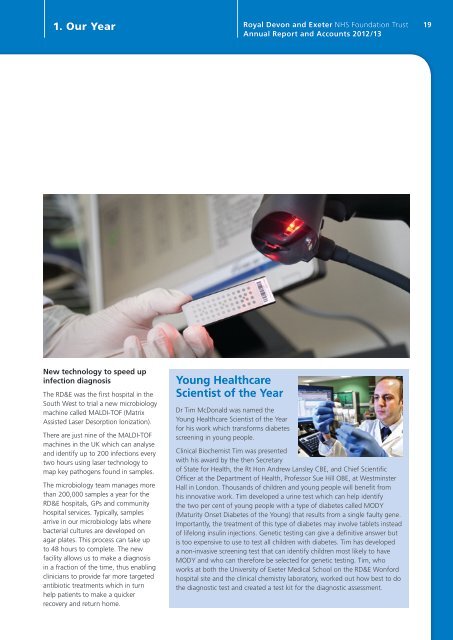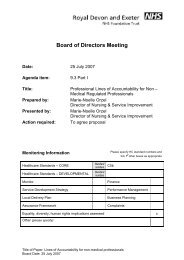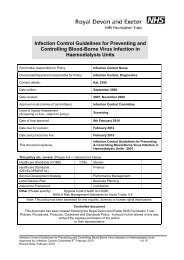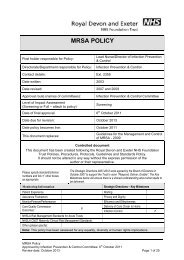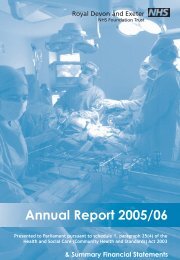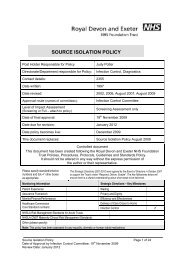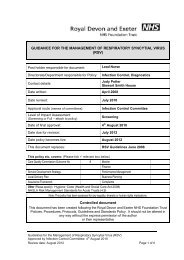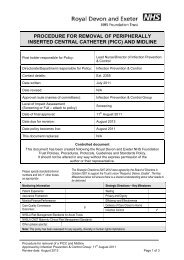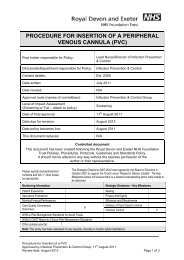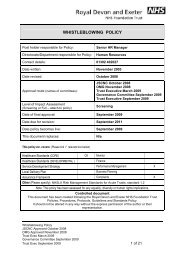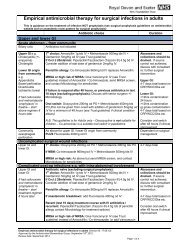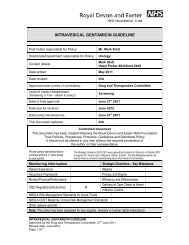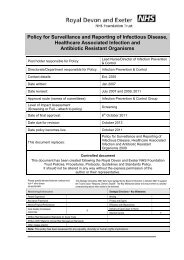Annual Report and Accounts 2012/13 - Royal Devon & Exeter Hospital
Annual Report and Accounts 2012/13 - Royal Devon & Exeter Hospital
Annual Report and Accounts 2012/13 - Royal Devon & Exeter Hospital
You also want an ePaper? Increase the reach of your titles
YUMPU automatically turns print PDFs into web optimized ePapers that Google loves.
1. Our Year<br />
<strong>Royal</strong> <strong>Devon</strong> <strong>and</strong> <strong>Exeter</strong> NHS Foundation Trust<br />
<strong>Annual</strong> <strong>Report</strong> <strong>and</strong> <strong>Accounts</strong> <strong>2012</strong>/<strong>13</strong><br />
19<br />
New technology to speed up<br />
infection diagnosis<br />
The RD&E was the first hospital in the<br />
South West to trial a new microbiology<br />
machine called MALDI-TOF (Matrix<br />
Assisted Laser Desorption Ionization).<br />
There are just nine of the MALDI-TOF<br />
machines in the UK which can analyse<br />
<strong>and</strong> identify up to 200 infections every<br />
two hours using laser technology to<br />
map key pathogens found in samples.<br />
The microbiology team manages more<br />
than 200,000 samples a year for the<br />
RD&E hospitals, GPs <strong>and</strong> community<br />
hospital services. Typically, samples<br />
arrive in our microbiology labs where<br />
bacterial cultures are developed on<br />
agar plates. This process can take up<br />
to 48 hours to complete. The new<br />
facility allows us to make a diagnosis<br />
in a fraction of the time, thus enabling<br />
clinicians to provide far more targeted<br />
antibiotic treatments which in turn<br />
help patients to make a quicker<br />
recovery <strong>and</strong> return home.<br />
Young Healthcare<br />
Scientist of the Year<br />
Dr Tim McDonald was named the<br />
Young Healthcare Scientist of the Year<br />
for his work which transforms diabetes<br />
screening in young people.<br />
Clinical Biochemist Tim was presented<br />
with his award by the then Secretary<br />
of State for Health, the Rt Hon Andrew Lansley CBE, <strong>and</strong> Chief Scientific<br />
Officer at the Department of Health, Professor Sue Hill OBE, at Westminster<br />
Hall in London. Thous<strong>and</strong>s of children <strong>and</strong> young people will benefit from<br />
his innovative work. Tim developed a urine test which can help identify<br />
the two per cent of young people with a type of diabetes called MODY<br />
(Maturity Onset Diabetes of the Young) that results from a single faulty gene.<br />
Importantly, the treatment of this type of diabetes may involve tablets instead<br />
of lifelong insulin injections. Genetic testing can give a definitive answer but<br />
is too expensive to use to test all children with diabetes. Tim has developed<br />
a non-invasive screening test that can identify children most likely to have<br />
MODY <strong>and</strong> who can therefore be selected for genetic testing. Tim, who<br />
works at both the University of <strong>Exeter</strong> Medical School on the RD&E Wonford<br />
hospital site <strong>and</strong> the clinical chemistry laboratory, worked out how best to do<br />
the diagnostic test <strong>and</strong> created a test kit for the diagnostic assessment.


